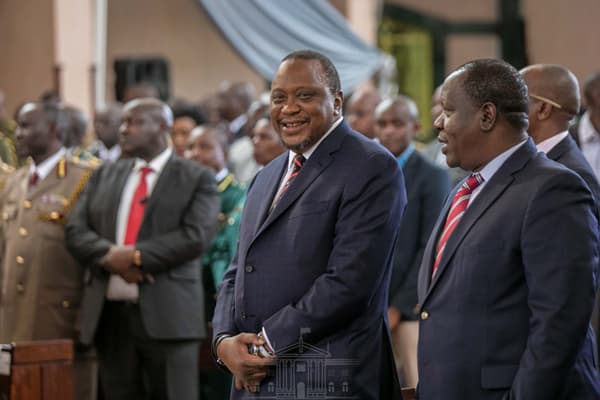We're loading the full news article for you. This includes the article content, images, author information, and related articles.
Former President Uhuru Kenyatta signals a decisive return to Kenya's political arena, backing former Interior CS Fred Matiang'i for the presidency and vowing to rectify what he terms the "mistakes" of the 2022 election.

Former President Uhuru Kenyatta has formally declared his intention to actively shape Kenya's 2027 general election, culminating in the endorsement of former Interior Cabinet Secretary Dr. Fred Matiang'i as his preferred presidential candidate. This move signals a significant political realignment, positioning the former head of state as a central figure in the opposition's strategy to challenge President William Ruto's administration.
Speaking at a Jubilee Party leaders' meeting in Murang'a County on Friday, November 7, 2025 (EAT), Kenyatta asserted that his choice of Dr. Matiang'i was based on merit, describing him as a "progressive and transformative worker." He told party delegates that unlike his perceived hands-off approach in 2022, he would be more candid and directly involved in the run-up to 2027. "I told you and proposed what I perceived to be the best interests for the region and the country but you know how it ended... I am re-strategising, starting at home," Kenyatta stated, referencing his unsuccessful backing of Raila Odinga in the previous election.
Kenyatta's announcement is the latest in a series of calculated moves to revive the Jubilee Party, which suffered a significant defeat in the 2022 polls. After a period of public silence post-retirement, Kenyatta has reasserted his control over the party machinery, quashing internal leadership wrangles. A pivotal moment was the party's Special National Delegates Convention (NDC) held on September 26, 2025, at the Ngong Racecourse in Nairobi. During the NDC, Kenyatta rallied his supporters, promising to reorganize the party and field strong candidates across the country in the next election.
His renewed political activity breaks from the tradition of his predecessors, who largely retired from active politics after leaving office. Analysts note that Kenyatta, being younger than past retired presidents, has both the constitutional right and the energy for continued political participation. His strategy appears to involve not just endorsing a candidate but also rebuilding Jubilee's grassroots structures to re-establish its influence, particularly in its former stronghold of the Mt. Kenya region.
The selection of Dr. Fred Matiang'i, who served in several powerful ministerial roles under Kenyatta, is seen as a strategic choice. Known for his reputation as a disciplined and effective technocrat, Matiang'i's potential candidacy is expected to appeal to voters seeking a focus on governance and implementation. Jubilee Secretary-General Jeremiah Kioni has consistently maintained that the party is keen on fronting Dr. Matiang'i, a position the former president has now publicly affirmed. Dr. Matiang'i himself declared his presidential ambitions in May 2025 and has since embarked on grassroots tours to build his profile.
This endorsement, however, sets the stage for a complex political battle, particularly in the Mt. Kenya region, where Deputy President Rigathi Gachagua has been working to consolidate his position as the area's political kingpin. In a move seen as an attempt to de-escalate regional tensions, Kenyatta, during the Murang'a meeting, explicitly warned Jubilee officials against insulting other leaders, including Mr. Gachagua. "This trend of insulting other leaders in the name of defending our party is rubbish. I don't want to hear anyone insulting Gachagua," Kenyatta warned.
Kenyatta's re-entry and endorsement of Matiang'i fundamentally alters the political landscape ahead of 2027. It signals the formation of a serious opposition force, potentially uniting various factions against the incumbent. Political commentators suggest Kenyatta's influence, financial clout, and strategic experience will be significant factors. His actions are viewed by some as an attempt to correct the 2022 electoral outcome and secure his legacy, while critics raise concerns about a former president actively working to unseat his successor.
Beyond Kenya, Kenyatta has maintained a role as a regional statesman, including his involvement in peace processes. His recent political manoeuvres are being closely watched across East Africa, as the stability and political direction of Kenya have significant implications for the entire region. His recent calls for a youth-led "revolution" in governance during a summit in Kampala, Uganda, in April 2025, were interpreted by President Ruto's allies as an attempt to incite unrest, a charge Kenyatta's supporters deny. As the 2027 election cycle draws closer, Kenyatta's role as a political kingmaker, rather than a candidate, appears set to be a defining feature of Kenyan politics.
Keep the conversation in one place—threads here stay linked to the story and in the forums.
Sign in to start a discussion
Start a conversation about this story and keep it linked here.
Other hot threads
E-sports and Gaming Community in Kenya
Active 9 months ago
The Role of Technology in Modern Agriculture (AgriTech)
Active 9 months ago
Popular Recreational Activities Across Counties
Active 9 months ago
Investing in Youth Sports Development Programs
Active 9 months ago
Key figures and persons of interest featured in this article